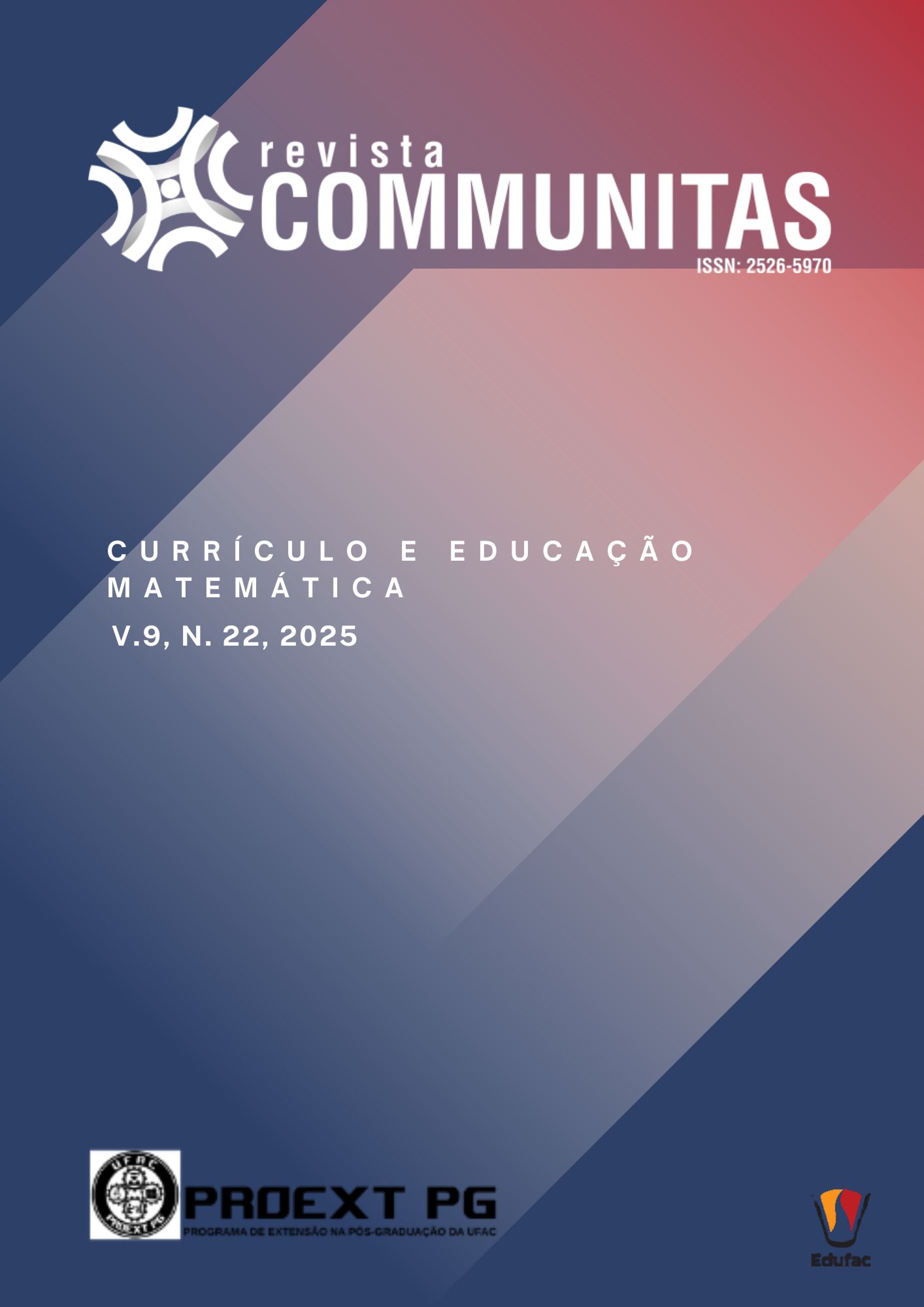MULTIPLICAÇÃO E MENTALIDADE MATEMÁTICA
uma abordagem inspirada na matemática problematizada
DOI:
https://doi.org/10.29327/268346.9.22-8Keywords:
Mentalidade Matemática, Matemática Problematizada, Construção Coletiva, Conexões Matemáticas, Ensino FundamentalAbstract
This study investigated how a problematizing approach to mathematics teaching can foster the development of a growth mathematical mindset and enhance students’ conceptual understanding of multiplication. The research was conducted with 8th-grade students from a Brazilian middle school, using manipulatives to promote active knowledge construction through exploration, inquiry, and collective reflection. The proposal aimed to break away from traditional practices, encouraging students to articulate mathematical concepts in an integrated and contextualized manner. The results indicate that the use of manipulatives facilitated the visualization of concepts, stimulated the formulation of hypotheses, and supported the autonomous construction of mathematical connections. Problematization allowed errors to be understood as learning opportunities, contributing to students’ self-confidence. Furthermore, the development of a mathematical mindset was also observed at the collective level, fostered through collaboration among peers. The study also highlighted the importance of the teacher’s role as a facilitator in this process, responsible for planning, mediating, and encouraging this investigative dynamic. Thus, the study reaffirms that pedagogical practices that value problematization, interaction, and critical reflection contribute positively to deeper learning and to strengthening a growth mathematical mindset.
Downloads
References
BOALER, J. Mentalidades matemáticas: estimulando o potencial dos estudantes por meio de matemática criativa, das mensagens inspiradoras e do ensino inovador. Porto Alegre, RS: Penso, 2018.
BOGDAN, R.; BIKLEN, S. Qualitative Research for Education: an introduction to theory and methods. 5. ed. Boston: Allyn & Bacon, 2007.
BORASSI, R. Reconceiving mathematics intruction: a focus on erros. Norwood: Ablex Publishing, 1996.
BORBA, M. A pesquisa qualitativa em Educação Matemática. In Reunião anual da Anped, 27., 2004, Caxambu, MG. Anais da 27ª Reunião Anual da Anped. Caxambu, MG, 2004, p. 1-18. Disponível em: https://igce.rc.unesp.br/Home/Pesquisa58/gpimem-pesqeminformaticaoutrasmidiaseeducacaomatematica/borba-minicurso_a-pesquisa-qualitativa-em-em.pdf. Acesso em: 13 abr. 2025.
BORBA, M.; ARAÚJO, J. Pesquisa qualitativa em educação matemática: notas introdutórias. In: BORBA, M.; ARAÚJO, J. (Orgs.). Pesquisa qualitativa em educação matemática. 6. ed. Belo Horizonte, MG: Autêntica, 2020. p. 23-29.
COCHRAN-SMITH, M.; LYTLE, S. Inquiry as stance: practitioner research for the next generation. New York: Teachers College Press, 2009.
DWECK, C. Mindset: a nova psicologia do sucesso. Rio de Janeiro, RJ: Objetiva, 2017.
FERNANDES, F.; GARNICA, A. Metodologia de pesquisa em Educação Matemática: éticas e políticas na inserção de novos sujeitos, cenários e conhecimentos. Perspectivas da Educação Matemática, UFMS, MS, v. 14, n. 34, p. 1-16, 2021. Disponível em: https://periodicos.ufms.br/index.php/pedmat/article/view/12785/8943. Acesso em: 13 abr. 2025.
FERRAÇO, C.; ALVES, N. As pesquisas com os cotidianos das escolas: pistas para se pensar a potência das imagensnarrativas na invenção dos currículos e da formação. Espaço do Currículo, [s.l.], v. 8, n. 3, p. 306-316, 2015. Disponível em: https://periodicos.ufpb.br/index.php/rec/article/view/rec.2015.v8n3.306316/14761. Acesso em: 13 abr. 2025.
FRANCISCHETT, M. Refletindo sobre pesquisa-ação. Faz ciência, Francisco Beltrão, PR, v. 3, n. 1, p. 167-176, 1999. Disponível em: https://e-revista.unioeste.br/index.php/fazciencia/article/view/7478/5529. Acesso em: 13 abr. 2025.
GIRALDO, V. Formação de professores de matemática: para uma abordagem problematizada. Ciência & Cultura, São Paulo, SP, v. 70, p. 37-42, 2018. Disponível em: Acesso em: http://cienciaecultura.bvs.br/scielo.php?script=sci_arttext&pid=S0009-67252018000100012&lng=pt&tlng=pt. 13 abr. 2025.
GIRALDO, V. Que matemática para a formação de professores? Por uma matemática problematizada. In: Encontro Nacional de Educação Matemática, 13., 2019, Cuiabá. Anais do XIII Encontro Nacional de Educação Matemática (XIII ENEM). Cuiabá, MT: SBEM, 2019, p. 1-12.
GIRALDO, V.; ROQUE, T. Por uma matemática problematizada: as ordens de (re)invenção. Perspectivas da Educação Matemática, UFMS, MS, v. 14, n. 35, p. 1-21, 2021. Disponível em: https://periodicos.ufms.br/index.php/pedmat/article/view/13409/9355. Acesso em: 13 abr. 2025.
GOJAK, L. Making mathematical connections. 2013. Disponível em: https://www.nctm.org/News-and-Calendar/Messages-from-the-President/Archive/Linda-M_-Gojak/Making-Mathematical-Connections/. Acesso em: 13 abr. 2025.
HIEBERT, J.; CARPENTER, T. Learning and teaching with understanding. In: GROUWS, D. (org.). Handbook of research on mathematics teaching and learning. New York: Macmillan, 1992. p. 65–97.
HODGSON, T. R. Connections as problem-solving tools. In: HOURSE, P. A.; COXFORD, A. F. (org.). 1995 Yearbook of the National Council of Teachers of Mathematics. Reston, VA: National Council of Teachers of Mathematics, 1995. p. 13–21.
LORENZATO, S. Laboratório de ensino de matemática e materiais didáticos. In: LORENZATO, S. (Org.) O Laboratório de Ensino de Matemática na Formação de Professores. 3. ed. Campinas, SP: Autores Associados, 2012. p.3-37.
MENEZES, F.; QUINTANEIRO, W. Problematizando saberes de conteúdo matemático do ensino numa perspectiva política. Ensino da Matemática em Debate, [s.l.], v. 10, n. 2, p.58-86, 2023. Disponível em: https://revistas.pucsp.br/index.php/emd/article/view/61201/43347. Acesso em: 13 abr. 2025.
MICHALISZYN, S.; TOMASINI, R. Pesquisa: orientações e normas para elaboração de projetos monográficos e artigos científicos. Petrópolis, RJ: Vozes, 2005.
NATIONAL COUNCIL OF TEACHERS OF MATHEMATICS (NCTM). Principles and standards for school mathematics. Reston, VA: National Council of Teachers of Mathematics, 2000.
NATIONAL COUNCIL OF TEACHERS OF MATHEMATICS (NCTM). Curriculum focal points for prekindergarten through grade 8 mathematics: A quest for coherence. Reston, VA: National Council of Teachers of Mathematics, 2006.
NÓVOA, A. Professores: imagens do futuro presente. Lisboa: Educa, 2009.
PONTE, J. P. À procura da mistura perfeita. In: LEIRIMAT. 10 textos de conferências e comunicações. Macieira, Portugal, 2003.
PONTE, J. P.; BROCARDO, J.; OLIVEIRA, H. Investigação matemática na sala de aula. 4. ed. Belo Horizonte, MG: Autêntica, 2020.
SUGIMAN. Mathematical connections in learning mathematics in junior high school. 2008. Disponível em: http://staff.uny.ac.id/dosen/Dr-sugiman-MSi. Acesso em: 13 abr. 2025.
THIOLLENT, M. Metodologia da pesquisa-ação. 18. ed. São Paulo, SP: Cortez, 2011.
ZEICHNER, K.; DINIZ-PEREIRA, J. Pesquisa dos educadores e formação docente voltada para transformação social. Cadernos de Pesquisa, [s.l.], v. 35, n. 125, p. 63-80, 2005. Disponível em: https://www.scielo.br/j/cp/a/Zx9H96h48wrzY7DsrggHTQq/abstract/?lang=pt. Acesso em: 13 abr. 2025.
Downloads
Published
How to Cite
Issue
Section
License
Copyright (c) 2025 Communitas

This work is licensed under a Creative Commons Attribution-NonCommercial 4.0 International License.
The Copyright for articles published in this magazine belongs to the author, preserving the rights of first publication for the Communitas Magazine. Because they appear in this publicly accessible journal, the articles are free to use, with their own attributions, in educational and non-commercial applications.




























